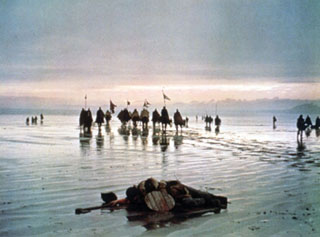Potent Adaptations
On Wednesday night, I attended a revival screening of Roman Polanski's infamous film adaptation of Shakespearian MacBeth and suppose now is as good a time as any to write about it. In addition, and in keeping, the day prior I rewatched Claire Denis' rather loose adaptation of Herman Melville's Billy Budd, the film capital F Film cinefiles wet themselves over (which I found rather bland, but perhaps more because of others' wild devotion), Beau Travail (Good Work). And though you may already know my stance on capital F Films, I will open-mindedly further on my opinion of the film below. But first, MacBeth.

First allow me to state that I am no expert when it comes to Shakespearian adaptation. In my (perhaps youthful) opinion, most "classical" adaptations of his works are clumsy, cardboard and awkward. Having been thoroughly unimpressed by some of the works that are considered the greatest Shakespearian adaptations, it is startling (and proof of Polanski's masterful directorial capabilities) that he creates a world where all of the period garb and iambic pentameter come off casually, naturally even. Though one of the juiciest roles ever written falls rather flat on Francesca Annis' rendition of Lady Macbeth, Polanksi's uncompromising vision of this violent and tormented world is as exhilarating and compelling as it is excruciating. The scene that follows the credit sequence finds a body lying face down on the murky shoreline. Blood pools in a puddle. A man tugs on the body's foot. One might assume he is attempting to find fellow fighters who have survived this catastrophe. Yet our perception of this world is solidly established as the man whom we have presumed is dead rears his head back to be met with the other man's mace, which he beats into the wounded man's back repeatedly, leaving a crater of mangled flesh and protruding bone.
 This is our introduction to our eponymous protagonist's world. Watching the film, I found myself yearning for a great volume to be published interpreting the film. I felt only capable of penetrating a thin layer of the film's shell. This was my second viewing of the film, and still, subtleties abound, I found myself barely understanding much of the great flourishes beyond the most intrinsic plot points. It is an immense film in all respects. The dialogue, so wonderfully shifting between voice-over and spoken word, flows poetically and unpretentiously - which, come on, is a feat in Shakespearian adaptation. Ultimately, the film proves most effective because its flawless visual stylizations. It is a rare gem (all the more so on the big screen), so consistent in its representation of this grisly yet enchantingly beautiful world that when one leaves the theater, they are surprised by the (slightly more mundane) world outside.
This is our introduction to our eponymous protagonist's world. Watching the film, I found myself yearning for a great volume to be published interpreting the film. I felt only capable of penetrating a thin layer of the film's shell. This was my second viewing of the film, and still, subtleties abound, I found myself barely understanding much of the great flourishes beyond the most intrinsic plot points. It is an immense film in all respects. The dialogue, so wonderfully shifting between voice-over and spoken word, flows poetically and unpretentiously - which, come on, is a feat in Shakespearian adaptation. Ultimately, the film proves most effective because its flawless visual stylizations. It is a rare gem (all the more so on the big screen), so consistent in its representation of this grisly yet enchantingly beautiful world that when one leaves the theater, they are surprised by the (slightly more mundane) world outside.
 My rewatching of Denis' film coincides with the release of her new film, L'Intrus (The Intruder), a review of which you will be able to find here on March 21st. Unlike MacBeth, Beau Travail is almost purely a visual film. Intending it to serve more as a visual poem, Denis primarily concerns herself with only the expository details of her adaptive source. It is circumstantial. One gleans a greater sense of conflict from the Legionaires interactions with the native people of the French occupied Djibouti(of Denis' contruct) than between Galoup and Sentain (here the Captain Vere and Billy Budd characters, respectively of Mellvilel's). In fact, the main impeuts of their conflict in Denis' world stems from a more homosocial form of vanity. While Galoup plays flaneur in both the African village and through the streets of Paris (where one most typically may play flaneur) he emits an ostracized glare which takes more menacing tones when affixed on the eroticized mug of Sentain.
My rewatching of Denis' film coincides with the release of her new film, L'Intrus (The Intruder), a review of which you will be able to find here on March 21st. Unlike MacBeth, Beau Travail is almost purely a visual film. Intending it to serve more as a visual poem, Denis primarily concerns herself with only the expository details of her adaptive source. It is circumstantial. One gleans a greater sense of conflict from the Legionaires interactions with the native people of the French occupied Djibouti(of Denis' contruct) than between Galoup and Sentain (here the Captain Vere and Billy Budd characters, respectively of Mellvilel's). In fact, the main impeuts of their conflict in Denis' world stems from a more homosocial form of vanity. While Galoup plays flaneur in both the African village and through the streets of Paris (where one most typically may play flaneur) he emits an ostracized glare which takes more menacing tones when affixed on the eroticized mug of Sentain.
 Though it may sound slightly conservative of me, I'm not sure whether Denis is the figure deserving of all the credit she receives for the visual potency of her films. Without Agnes Godard, who has served as cinematographer for Denis since her 1990 television short Cinema, de notre temps: Jacques Rivette - Le veilleur and has been employed as cinematographer for a handful of remarkable directors (Wim Wenders, Agnes Varda, Andre Techine and Sebastien Lifshitz to name a few), I am not too certain the films of Denis would glow and resonate in the same rich way that they do with Godard in tote. The visuals are what defines Beau Travail. In tableaus that echo the work of James Benning, Godard captures compelling moments from the most banal settings between Djibouti and Paris (though I find it hard pressed to find a boring setting in the beautiful city of Paris). The first time I watched the film(or at least attempted to, abandoning it halfway through), I found it visually sumptuous, yet substantially slight. Upon second viewing, I found this, in a very roundabout way, is a strength to the film, functioning in a very similar way as Denis' Trouble Every Day . And I'll be damned if the last scene of the film is not one of the better scenes I have seen in a good long while. Set to Corona's hopelessly dated, yet somehow transcendent "The Rhythm of the Night," in a strange, unexpected way, it folds the film in on itself in a very complicated way and speaks far better than any words could. Ultimately, Beau Travail is a film I want not to like, yet prevents me from doing so because of the isolated moments which catch me off guard with their sumptuous images and understated complexity. I suppose would recommend it, but not as fervently as I would Polanski's MacBeth.
Though it may sound slightly conservative of me, I'm not sure whether Denis is the figure deserving of all the credit she receives for the visual potency of her films. Without Agnes Godard, who has served as cinematographer for Denis since her 1990 television short Cinema, de notre temps: Jacques Rivette - Le veilleur and has been employed as cinematographer for a handful of remarkable directors (Wim Wenders, Agnes Varda, Andre Techine and Sebastien Lifshitz to name a few), I am not too certain the films of Denis would glow and resonate in the same rich way that they do with Godard in tote. The visuals are what defines Beau Travail. In tableaus that echo the work of James Benning, Godard captures compelling moments from the most banal settings between Djibouti and Paris (though I find it hard pressed to find a boring setting in the beautiful city of Paris). The first time I watched the film(or at least attempted to, abandoning it halfway through), I found it visually sumptuous, yet substantially slight. Upon second viewing, I found this, in a very roundabout way, is a strength to the film, functioning in a very similar way as Denis' Trouble Every Day . And I'll be damned if the last scene of the film is not one of the better scenes I have seen in a good long while. Set to Corona's hopelessly dated, yet somehow transcendent "The Rhythm of the Night," in a strange, unexpected way, it folds the film in on itself in a very complicated way and speaks far better than any words could. Ultimately, Beau Travail is a film I want not to like, yet prevents me from doing so because of the isolated moments which catch me off guard with their sumptuous images and understated complexity. I suppose would recommend it, but not as fervently as I would Polanski's MacBeth.

0 Comments:
Post a Comment
<< Home